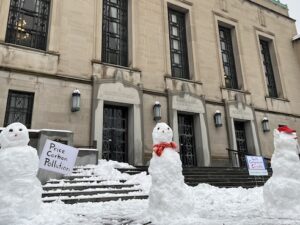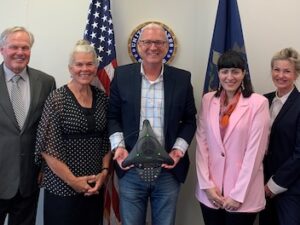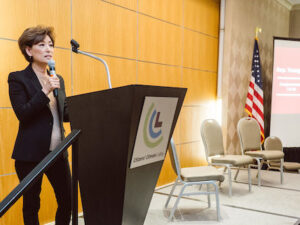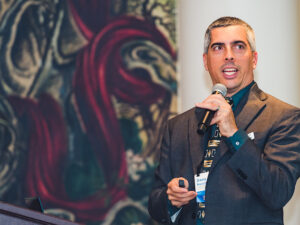Senator Chris Coons (D-DE) spoke at CCL’s Mid-Atlantic Regional Conference on Saturday, January 18, 2020. Read and watch highlights of his remarks below, or watch the full speech here.
Thank you all for taking time to be here today. I hope those of you who are visiting Wilmington, Delaware, for the first time will take some time to really get to know our community and the remarkable revitalization that is happening right here on our riverfront.
There’s a lot of important work that’s been done to make this area more resilient in literally the lowest lying state in America. Sometimes the senators from Florida and Louisiana want it different, but it’s a scientific fact that Delaware is literally the lowest mean elevation state, and we are sitting on a piece of rock that is subsiding. The combination of our low elevation and subsidence means that we’re going to suffer some of the consequences of sea-level rise as early as South Florida or Louisiana.
Now let me take a moment also to thank Representative Kim Williams and State Senator Delcollo for being here as well. It is important that we find a path forward together on climate because frankly, in the 10 years that I’ve been in the United States Senate, there has been precious little bipartisanship.
As a scientist, as someone who worked in the materials based science company, I think the evidence that the climate is changing rapidly in a frightening way, that human activity has contributed to or even driven that climate change, leads to a simple conclusion: we must do something that will make a major impact and change the trajectory.
"The world looks to us for leadership," @ChrisCoons said at a recent CCL conference.
Other countries are "disappointed & disheartened" at our lack of #climate leadership.
"We must do something that will make a major impact & change the trajectory" of the crisis.
Watch: pic.twitter.com/yFgihOwkl6
— Citizens' Climate Lobby (@citizensclimate) January 27, 2020
I was at Paris for the conference that led to one of the most widely adopted conventions in human history, and while the agreement was not perfect, it was strong. It was an important next step. It moved us forward. Having a chance to meet with delegations from the small remote island nations that will literally be the first to disappear, to some of our greatest potential partners and competitors economically and in combating climate—India and China as well as our European partners—was an eye-opening opportunity.
If I wasn’t already convinced, based on the advocacy of my talented children, that worrying about climate was the most important thing I could be involved in, seeing a world come together at that conference was one of the more inspiring things that’s happened in my decade on the Foreign Relations Committee. Being in Singapore on the day that President Trump withdrew the United States from the Paris Agreement and meeting with delegations from seven countries was another bracing reminder that the world looks to us for leadership.
I was on that trip with Senator John McCain—in fact, it was his last trip. It was a remarkable opportunity in Singapore to see how much the world looks to us for leadership and how disappointed, disheartened, even greatly concerned our vital allies in Europe and throughout Asia were about what it meant for our engagement and leadership in the world, to have the United States withdraw from this carefully crafted agreement where we played such a central role in getting it together in the first place.
I am tempted to say simply, any skeptics left about climate change, in watching the tragedy of the forest fires that are destroying huge swaths of Australia today have to have some profound questions, if not on the front of their mind, at least on the back of their mind. On some level, we are koalas now. We are living in a planet on fire where the steady heating of our atmosphere has led to hundreds of billions of dollars of impact.
Climate change is costing us billions, Sen. @ChrisCoons told a CCL conference in Delaware.
"If you're a fiscal conservative worried about America's balance sheet, look at the amount we have spent year after year on disaster response to hurricanes, to wildfires, to floods." pic.twitter.com/VFW1Xm7wCX
— Citizens' Climate Lobby (@citizensclimate) January 28, 2020
If you’re just a fiscal conservative worried about America’s balance sheet, look at the amount we have spent year after year on disaster response to hurricanes, to wildfires, to hundred year floods, five hundred year floods, thousand year floods. Our Earth is warming at an alarming rate, and the impact for all of us and our children and our children’s children demands action.
I’m glad that you’re here. I am grateful to all of you for coming across the region and across different backgrounds, different political and faith backgrounds, different trainings, and different world views. That you can come together has helped make the CCL such an effective advocacy organization. To Marty and everyone from the Delaware chapter, thank you for being engaging.
It was wonderful to see, on the way in, artwork on one side designed to engage and uplift the spirit through different means than the numbers and the scientific analysis that I tend to turn to. Then on the other side, profiles of every single member of the congressional delegations, with a little envelope to leave a love note for those of us who still need some persuading. That is uplifting, inspiring, and engaging all at the same time. Thank you for what you’re doing to help get us all to the table.
Mike Braun is a freshman Republican senator from downstate Indiana—the part of Indiana where coal mining is still active and an important part of the culture and the economy of his state. That was his district when he was in the State House and, bluntly, he beat a good friend of mine: Joe Donnelly. As is often the case in the Senate where relationships matter, I had a hard time the first couple months, because all I could see when I saw Mike was my dear friend Joe, and all I knew about him was what I heard on the campaign trail. But my job is to figure out ways that we can work together even when we have bitter partisan divisions on lots of other issues.
I made an appointment, asked Mike out to breakfast, and we sat and talked for a while. I was pleasantly surprised to discover he was a conservationist. Much of his personal wealth was tied up in forest land that he’d initially bought as a hundred acres decades ago and then 200, then 500, then a thousand. He’d spent decades walking through this forested land and developing plans for how to sustainably harvest forest land, and that made him committed conservationist.
I asked him what he was most proud of from his time in the State Legislature, and it was that he managed to pull together a broad range of business and manufacturing and advocacy groups to support increasing the gas tax, because frankly the infrastructure of the state of Indiana was badly broken.
If you take those two points and draw a common line, you can see someone who’s willing to take bold action if persuaded that the climate is changing. So to get to the punch line, Mike and I, after a number of meetings and conversations have launched the first bipartisan Climate Solutions Caucus in the U.S. Senate.
.@ChrisCoons & @SenatorBraun formed the bipartisan Senate #ClimateSolutionsCaucus, which is now hosting meetings & briefings about climate.
"Even in the bitter & divided partisan environment" in DC right now, Sen. Coons is "optimistic this group will continue our path forward." pic.twitter.com/Al1LZht40n
— Citizens' Climate Lobby (@citizensclimate) January 29, 2020
The first thing we did as a caucus was to meet with a group of CEOs because, frankly, it’s not the Democrats who need persuading about the need for bold action. The folks that we’ve got on the caucus tend to be folks who work well across the aisle and who demonstrated long-term engagement in this area.
We had a group from the CEO Climate Dialogue, which is a group of CEOs of major companies globally who are committed to sustainability, to combating climate change and we discovered in a vigorous conversation, uniformly, to set a fee on carbon. Some of these like BASF and Dow are household name global, chemical, and material science companies. Another, DTE Energy based out of Detroit, one of the largest of the base 11 power generating and distributing companies. Another, Lafarge, perhaps not known to you, but literally the world’s largest cement manufacturer.
We had advocates from environmental groups like the World Resources Institute and we’ve had conversations with groups like the Chamber of Commerce, the Business Roundtable and the National Association of Manufacturers. We’ve had a series of private dinners. We’ve had a series of public meetings. We’ve had a series of staff briefings. Even in the bitter and divided partisan environment of the next couple of weeks when something else is going on—we’ll probably be on jury duty every day—I’m optimistic that this group will continue our conversation and continue our path forward.
Without your engagement, without your education, without your advocacy, this will not happen. We need your letters to the editor. We need your postings in social media. We need your conversations with state and local elected officials.
We need to change from a perception, nationally and in Washington, that this is a dangerous conversation, where you don’t want to touch it or your career is over. I will tell you in state legislatures around the country, that was the same view of raising the gas tax. The federal government hasn’t raised the gas tax since 1992 and as a result our roads and bridges and highways are literally falling down. Our infrastructure is in the worst shape of any advanced economy, and it’s because of a concern about the politics of taxation.
Americans don’t like paying taxes. Americans don’t trust their government to spend their revenue wisely, I get that, but there are dozens of states now where state legislators have done the work, have engaged in the study, have engaged in their community and have decided to increase the investment in infrastructure. To me, this is a similar, although very distinct argument.
Getting people that understand the ways in which a price on carbon then unleashes the marketplace to invest in innovation, to deploy new technologies, to tackle what is literally an existential threat is exactly the work you’re engaging in. Let me conclude by saying thank you. Thank you for who you are. Thank you for the time you’re dedicating to this.
Recognize that although you are passionate about it and deeply engaged, the vast majority of my colleagues and our constituents and our friends and neighbors are not. The work we are in is important work. It’s soulful work. It’s life-changing work. Whether you care about the stewardship of creation or as a scientist, you believe in the numbers and the consequences, there are so many different reasons and ways we’ve gotten to this place at this time.
Thank you for believing in the possibility of change, for lifting your voices and for being part of the hands that will bend the arc of history in a direction of sustainability and survival.





